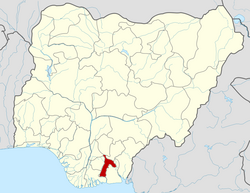Ikwuano Ikwuano | |
|---|---|
| Motto: Onye Ahala Nwanneya | |
 Interactive map of Ikwuano | |
| Coordinates: 5°26′N7°34′E / 5.433°N 7.567°E | |
| Country | |
| State | Abia State |
| Headquarters: | Isiala Oboro |
| Created | 1991 |
| Government | |
| • Type | Democratic |
| • Local Government Chairman | Dr. Anthony Nzeribe Nwaubani |
| • Local Government Deputy Chairman | Hon. Awuwa Lucky Chibuikem |
| Area | |
• Total | 281 km2 (108 sq mi) |
| Elevation | 122 m (400 ft) |
| Population (2022) [1] | |
• Total | 200,800 |
| • Density | 715/km2 (1,850/sq mi) |
| Time zone | UTC+1 (WAT) |
| 3-digit postal code prefix | 440 |
| Area code | 440 |
| ISO 3166 code | NG.AB.IK |
Ikwuano is a Local Government Area of Abia State, Nigeria. Its headquarters is in Isiala Oboro. The name 'Ikwuano' etymologically indicates that there are four different ancient kingdoms that make up the community called Ikwuano. These include Oboro, Ibere, Ariam/Usaka and Oloko. [2]
Contents
- History
- Women's War of 1929
- Culture
- Geography
- Demographics
- Climate
- Economy & Agriculture
- Villages grouped according to clans
- Autonomous communities
- Traditional rulers
- Executive Chairmen (1992-till date)
- Educational Institutions
- Notable people
- See also
- References
The postal code of the area is 440. [3] It is one of the five Local Government Areas that make up the Abia Central Senatorial District. [4] As at 2024, the executive chairman is Dr. Anthony Nzeribe Nwaubani. [5] Obi Aguocha currently serves as the Federal Representative representing Ikwuano/Umuahia North and South Federal Constituency at the House of Representatives. [6] The member representing Ikwuano State Constituency at the Abia State House of Assembly is Engr. Boniface Isienyi. [7]

